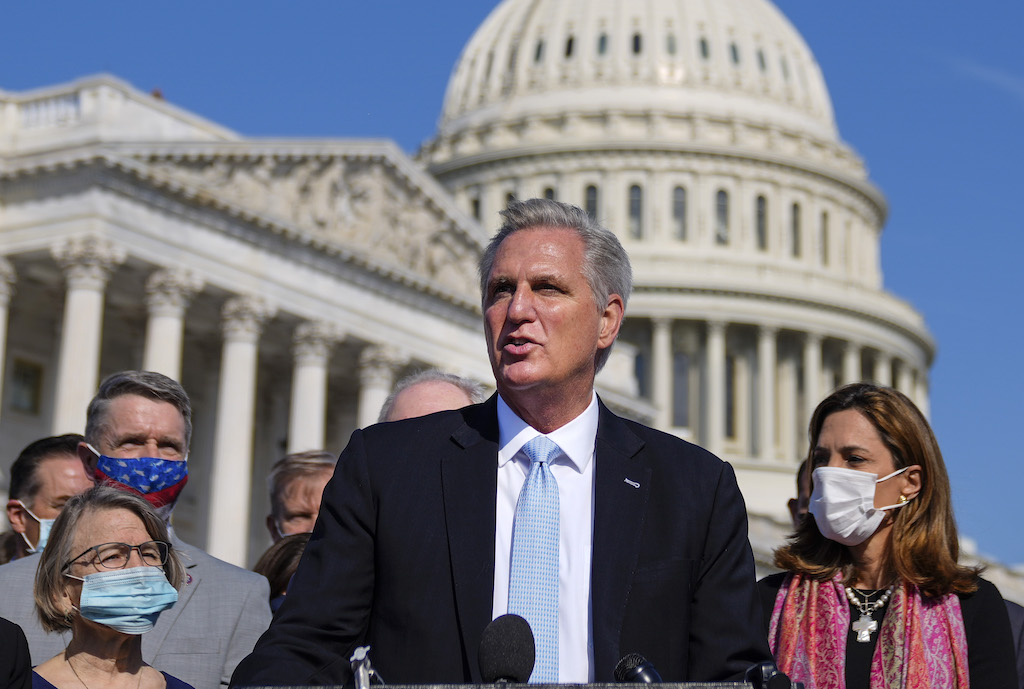Republicans Will Never Stop Trying to Destroy Social Security
GOP leaders are threatening to cut Social Security and Medicare if they take back the House this fall. Elected Democrats won’t have the will or power to stop them unless ordinary Americans are willing to put up a real fight.

House Minority Leader Kevin McCarthy (R-CA) speaks during a news conference with House Republicans outside the US Capitol on March 11, 2021. (Drew Angerer / Getty Images)
If Republicans take back the House this fall, they want to cut Social Security and Medicare. And according to Minority Leader Kevin McCarthy in an interview last week, they’re prepared to shut down the basic functions of government by holding the national debt ceiling hostage in order to do it.
That would be catastrophic for everyone who will rely on either program at some point in their lives — which is to say virtually the entire country. Given the two programs’ immense popularity, successfully undermining them would also be a blow to the very idea of public programs as ensurers of human welfare and dignity.
Social Security remains immensely popular. Eighty two percent of respondents were in favor of expanding benefits in a June 2022 poll, and less than a quarter were in favor of privatizing even part of the program. Similarly, significant majorities of voters support expanding Medicare to cover more forms of care as well as more people.
That might explain why McCarthy’s only option to cut the programs amounts to blackmailing the nation. Refusing to raise the debt limit, as Republicans have repeatedly done in the past, forces most parts of the government to shut down entirely. That creates difficult situations for millions of people, especially when the shutdowns last for an extended period. But because Republicans’ long-term strategy is based on degrading the government’s ability to carry out most of its functions, they generally feel they have little to lose from shutting it down.
“[I]f people want to make a debt ceiling [for a longer period of time], just like anything else, there comes a point in time where, okay, we’ll provide you more money, but you got to change your current behavior,” McCarthy said, later refusing to rule out cuts to either program when asked.
Other House Republicans are gunning for a fight even more strongly. “You have two simple leverage points: when government funding comes up and when the debt ceiling is debated,” Texas Republican Chip Roy said.
So far, to their credit, Democrats are not taking the bait. “I will not cut Social Security. I will not cut Medicare, no matter how hard they work at it,” President Joe Biden said last week. House Democrats have also seized on the issue in the final weeks of campaigning, promising to protect the programs against McCarthy’s and the GOP’s threats.
But it would be a mistake to get too comfortable. At the same event, Biden also ruled out the idea of eliminating the annual debt ceiling altogether, which would remove Republicans’ leverage to cut the programs. That idea is supported by Biden’s treasury secretary Janet Yellen, among others.
Perhaps more significant is Biden’s long history of proposing freezes, cuts, and privatization to Social Security and Medicare. As Branko Marcetic has reported, Biden has been an active advocate for cutting the programs since the 1980s, often allying with Republicans and opposing the majority of his Democratic colleagues to try to do so.
Biden campaigned on raising the retirement age when he ran for president in 2008, while also saying he would “absolutely” consider cutting the programs. Notably, he did not campaign on cuts to the programs in 2020, changing his tune as Bernie Sanders attacked his record on the issue.
On multiple occasions, Biden outraged Democratic colleagues during his term as vice president when, during negotiations with Republicans, he proposed cuts to Social Security, Medicare, and other programs seemingly on his own initiative. As Marcetic put it, this behavior caused congressional Democrats at the time to “believe Biden had gone over to the [Republican] Cantor-Kyl side.”
Nor is there much reason, beyond that one quote from last week, to believe that Biden has really transformed in recent years. Biden has continued a Donald Trump program that many experts say is designed to lay the groundwork to privatize Medicare. In May, Biden nominated a longtime proponent of privatizing Social Security to the program’s advisory board.
Of course, no one who proposes cuts to the programs will call them that. They will be couched in phrases like “reform” and “strengthening.” The programs’ supposed insolvency will be presented as a given, with “reforms” the only “responsible” way to ensure their continued existence.
Facing immense pressure to get things done in a divided Congress, a notoriously difficult group of conservative Democratic senators, and a House GOP willing to crash the economy and close the government to get what it wants, how strongly would Biden really stand against cutting programs he’s said he wants to cut for forty years? The answer depends on the actions of ordinary Americans. If we want to protect Medicare and Social Security, we’ll have to prepare to mount a popular movement against the GOP’s plans.